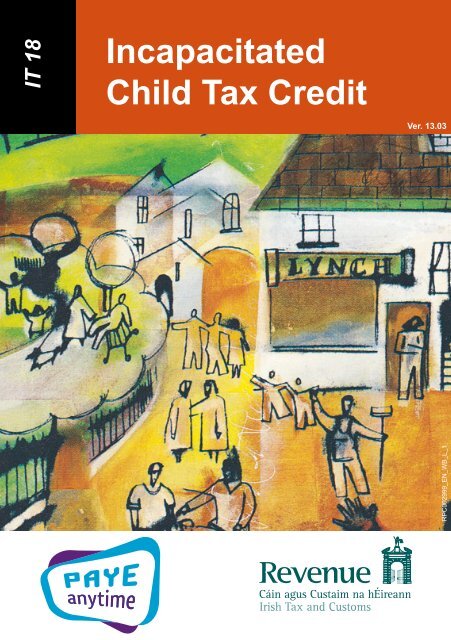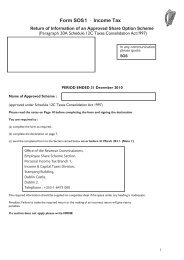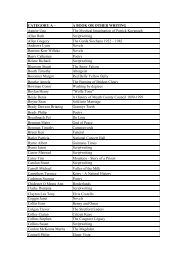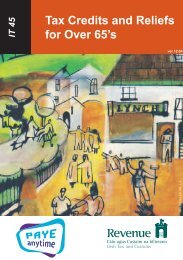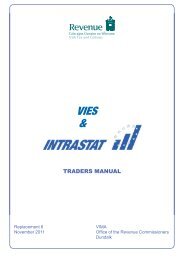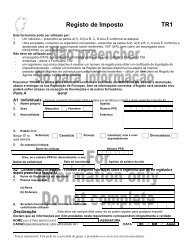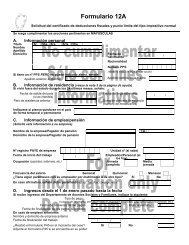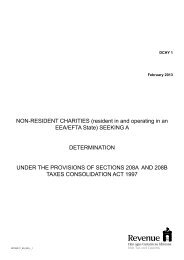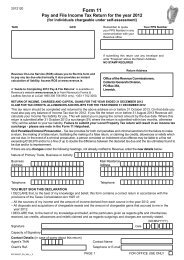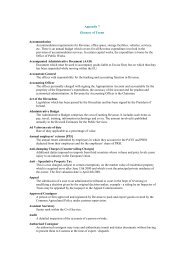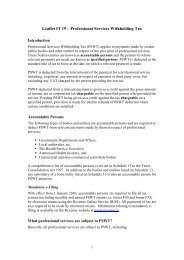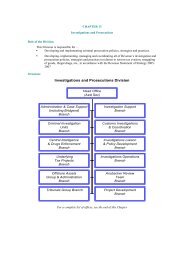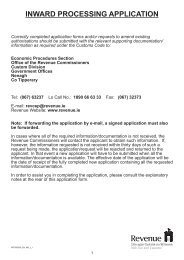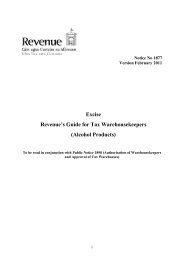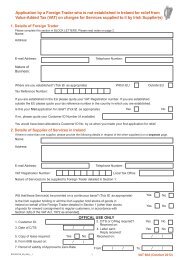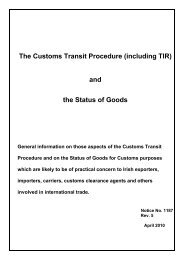Incapacitated Child Tax Credit - Revenue Commissioners
Incapacitated Child Tax Credit - Revenue Commissioners
Incapacitated Child Tax Credit - Revenue Commissioners
You also want an ePaper? Increase the reach of your titles
YUMPU automatically turns print PDFs into web optimized ePapers that Google loves.
IT 18<br />
<strong>Incapacitated</strong><br />
<strong>Child</strong> <strong>Tax</strong> <strong>Credit</strong><br />
Ver. 13.03<br />
RPC002999_EN_WB_L_1
Introduction<br />
The tax system provides additional tax credits and exemption of<br />
certain incomes in respect of persons with disabilities of a<br />
permanent nature. This leaflet outlines the circumstances in which<br />
the <strong>Incapacitated</strong> <strong>Child</strong> <strong>Tax</strong> <strong>Credit</strong> can be claimed.<br />
Who can claim <strong>Incapacitated</strong> <strong>Child</strong> <strong>Tax</strong> <strong>Credit</strong>?<br />
The tax credit can be claimed where a claimant proves that he or<br />
she has living at any time during a tax year any child who:<br />
<br />
is under 18 years of age and is permanently incapacitated<br />
either physically or mentally,<br />
or<br />
u<br />
if over 18 years of age at the commencement of the tax year<br />
and is permanently incapacitated either physically or mentally<br />
from maintaining himself or herself and had become so<br />
permanently incapacitated before reaching 21 years,<br />
or<br />
<br />
had become so permanently incapacitated after reaching<br />
21 years, but while he or she has been in receipt of<br />
full-time education at any university, college, school or other<br />
educational establishment, or while training full-time for a trade<br />
or profession for a minimum of two years,<br />
or<br />
is any child for whom the claimant has custody of and<br />
maintains at his or her own expense and who is permanently<br />
incapacitated.<br />
Where more than one child is permanently incapacitated, a tax<br />
credit may be claimed for each child.<br />
The amount of the tax credit that may be claimed is given in<br />
"Leaflet IT1" “<strong>Tax</strong> <strong>Credit</strong>s, Reliefs and Rates”.<br />
2
Note 1: The claimant may claim either the <strong>Incapacitated</strong> <strong>Child</strong><br />
<strong>Tax</strong> <strong>Credit</strong> or the Dependant Relative <strong>Tax</strong> <strong>Credit</strong> (see<br />
"Leaflet IT46") but not both in respect of the same child.<br />
Note 2: Where the child is maintained by one person only, that<br />
person is entitled to claim the full amount of the tax<br />
credit. However, where the child is maintained by more<br />
than one person, the tax credit is divided between them<br />
in proportion to the amount paid by each towards the<br />
maintenance of the child.<br />
Note 3: Where the child is the child of the claimant, they do not<br />
have to have custody of and maintain the child. This<br />
criteria only applies where an individual is claiming for<br />
a child who is not their own child.<br />
What incapacities qualify?<br />
The incapacity of the child must be such that it permanently<br />
prevents the child from being able in the long term (i.e. when over<br />
18 years of age) to maintain himself or herself independently. If the<br />
incapacity can be corrected or relieved by the use of any treatment,<br />
device, medication or therapy, for example, coeliac disease,<br />
diabetes, hearing impairment which can be corrected by a hearing<br />
aid, etc. the child will not be regarded as permanently incapacitated<br />
for the purposes of this relief.<br />
The following are examples of disabilities, which are regarded as<br />
permanently incapacitating:<br />
u Cystic Fibrosis, Spina Bifida, Blindness, severe and permanent<br />
Deafness that affects both ears, Down Syndrome, Spastic<br />
Paralysis, certain forms of Schizophrenia, Acute Autism. This<br />
list is not exhaustive.<br />
3
How can I claim?<br />
You can claim this credit by completing the '<strong>Incapacitated</strong> <strong>Child</strong><br />
<strong>Tax</strong> <strong>Credit</strong>' Claim Form or by contacting your <strong>Revenue</strong> LoCall<br />
number listed at the end of the leaflet.<br />
When making the claim, the following information is required:<br />
u<br />
u<br />
child’s name<br />
date of birth<br />
u nature of the incapacity<br />
In certain circumstances where it is not obvious that the child’s<br />
incapacity is of a serious and permanent nature a doctor’s certificate<br />
should be submitted with the initial claim.<br />
In such circumstances, the doctor’s certificate should contain the<br />
following information:<br />
u<br />
the date the incapacity first arose<br />
u the degree and extent of the incapacity<br />
u if it is a disability other than one of those listed on the previous<br />
page, (which are accepted as permanently incapacitating<br />
disabilities) whether the incapacity permanently prevents the<br />
child from being able in the long term (i.e. when over 18 years<br />
of age or in the case of the child being over 18 years of age -<br />
now) to maintain himself or herself independently.<br />
Where do I send this Form?<br />
The completed form should be returned to your <strong>Revenue</strong> office.<br />
The address can be found on your <strong>Tax</strong> <strong>Credit</strong> Certificate or an any<br />
correspondence you have received from <strong>Revenue</strong>. Alternatively,<br />
use our Contact Locator at www.revenue.ie to obtain the correct<br />
address.<br />
4
4-year limit<br />
A claim for tax relief must be made within four years after the end<br />
of the tax year to which the claim relates.<br />
Refunds<br />
<strong>Tax</strong> refunds can be paid by cheque to your address or by transfer<br />
to your Irish bank account.<br />
If you wish to have any refund paid directly to your Irish bank<br />
account, please supply your account details.<br />
Note: Any subsequent refunds will be made to this bank<br />
account until otherwise notified.<br />
It is not possible to make a refund directly to a foreign bank<br />
account.<br />
Accessibility<br />
If you are a person with a disability and require this leaflet in an<br />
alternative format the <strong>Revenue</strong> Access Officer can be contacted<br />
at accessofficer@revenue.ie<br />
5
Further Information<br />
This leaflet is for general information only. For further information<br />
visit www.revenue.ie or phone your <strong>Revenue</strong> LoCall service,<br />
whose number is listed below.<br />
u Border Midlands West Region 1890 777 425<br />
Cavan, Donegal, Galway, Leitrim,<br />
Longford, Louth, Mayo, Monaghan<br />
Offaly, Roscommon, Sligo, Westmeath<br />
u Dublin Region 1890 333 425<br />
Dublin (City and County)<br />
u East & South East Region 1890 444 425<br />
Carlow, Kildare, Kilkenny, Laois,<br />
Meath, Tipperary, Waterford,<br />
Wexford, Wicklow<br />
u South West Region 1890 222 425<br />
Clare, Cork, Kerry, Limerick<br />
Please note that the rates charged for the use of the 1890<br />
(LoCall) numbers may vary among different service providers.<br />
If you are calling from outside the Republic of Ireland, phone<br />
+ 353 1 702 3011.<br />
This leaflet is intended to describe the subject in general terms.<br />
As such, it does not attempt to cover every issue which may<br />
arise in relation to the subject. It does not purport to be a legal<br />
interpretation of the statutory provisions and consequently,<br />
responsibility cannot be accepted for any liability incurred or loss<br />
suffered as a result of relying on any matter published herein.<br />
<strong>Revenue</strong> <strong>Commissioners</strong><br />
March 2013<br />
6


